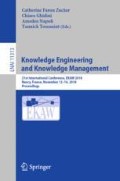Abstract
A prominent class of supervised methods for the representations adopted in the context of the Web of Data are designed to solve concept learning problems. Such methods aim at approximating an intensional definition for a target concept from a set of individuals of a target knowledge base. In this scenario, most of the well-known solutions exploit a separate-and-conquer approach: intuitively, the learning algorithm builds an intensional definition by repeatedly specializing a partial solution with the aim of covering the largest number of positive examples as possible. Essentially such a strategy can be regarded as a form of hill-climbing search that can produce sub-optimal solutions. To cope with this problem, we propose a novel framework for the concept learning problem called DL-Focl. Three versions of this algorithmic solution, built upon DL-Foil, have been designed to tackle the inherent myopia of the separate-and-conquer strategies. Their implementation has been empirically tested against methods available in the DL-Learner suite showing interesting results.
Access this chapter
Tax calculation will be finalised at checkout
Purchases are for personal use only
Notes
- 1.
This may be considered a basic upper refinement operator allowed by expressive DL languages (encompassing \(\mathcal {ALC}\)).
- 2.
A further correction of the ratios is made resorting to Laplace smoothing (m-estimates) to avoid divisions by 0.
- 3.
The source code and the datasets and ontologies are publicly available at: https://bitbucket.org/grizzo001/dlfocl/src/master/.
- 4.
The experiments were carried out on a 8-core Ubuntu server with 16 GB RAM.
- 5.
- 6.
References
Baader, F., Calvanese, D., McGuinness, D.L., Nardi, D., Patel-Schneider, P.F.: The Description Logic Handbook: Theory, Implementation and Applications, 2nd edn. Cambridge University Press, New York (2010)
Badea, L., Nienhuys-Cheng, S.-H.: A refinement operator for description logics. In: Cussens, J., Frisch, A. (eds.) ILP 2000. LNCS, vol. 1866, pp. 40–59. Springer, Heidelberg (2000). https://doi.org/10.1007/3-540-44960-4_3
Bühmann, L., Lehmann, J., Westphal, P.: DL-Learner - a framework for inductive learning on the Semantic Web. J. Web Sem. 39, 15–24 (2016)
De Raedt, L.: Logical and Relational Learning. Springer, Heidelberg (2008). https://doi.org/10.1007/978-3-540-68856-3
Fanizzi, N., d’Amato, C., Esposito, F.: DL-FOIL concept learning in description logics. In: Železný, F., Lavrač, N. (eds.) ILP 2008. LNCS (LNAI), vol. 5194, pp. 107–121. Springer, Heidelberg (2008). https://doi.org/10.1007/978-3-540-85928-4_12
Fanizzi, N., d’Amato, C., Esposito, F.: Induction of concepts in web ontologies through terminological decision trees. In: Balcázar, J.L., Bonchi, F., Gionis, A., Sebag, M. (eds.) ECML PKDD 2010. LNCS, vol. 6321, pp. 442–457. Springer, Heidelberg (2010). https://doi.org/10.1007/978-3-642-15880-3_34
Gendreau, M., Potvin, J.Y.: Handbook of Metaheuristics, 2nd edn. Springer, New York (2010). https://doi.org/10.1007/978-1-4419-1665-5
Heath, T., Bizer, C.: Linked Data: Evolving the Web into a Global Data Space. Synthesis Lectures on the Semantic Web. Morgan & Claypool Publishers, Sebastopol (2011)
Iannone, L., Palmisano, I., Fanizzi, N.: An algorithm based on counterfactuals for concept learning in the Semantic Web. Appl. Intell. 26(2), 139–159 (2007)
Lehmann, J., Fanizzi, N., Bühmann, L., d’Amato, C.: Concept learning. In: Lehmann, J., Voelker, J. (eds.) Perspectives on Ontology Learning, chap. 2, pp. 71–91. AKA/IOS Press (2014)
Lehmann, J., Hitzler, P.: Concept learning in description logics using refinement operators. Mach. Learn. 78(1–2), 203–250 (2010)
Lehmann, J., Auer, S., Bühmann, L., Tramp, S.: Class expression learning for ontology engineering. J. Web Semant. 9, 71–81 (2011)
Lehmann, J., Haase, C.: Ideal downward refinement in the \(\cal{EL}\) description logic. In: De Raedt, L. (ed.) ILP 2009. LNCS, vol. 5989, pp. 73–87. Springer, Heidelberg (2010). https://doi.org/10.1007/978-3-642-13840-9_8
Lehmann, J., Hitzler, P.: A refinement operator based learning algorithm for the \(\cal{ALC}\) description logic. In: Blockeel, H., Ramon, J., Shavlik, J., Tadepalli, P. (eds.) ILP 2007. LNCS, vol. 4894, pp. 147–160. Springer, Heidelberg (2008). https://doi.org/10.1007/978-3-540-78469-2_17
Pazzani, M., Kibler, D.: The utility of knowledge in inductive learning. Mach. Learn. 9(1), 57–94 (1992)
Rizzo, G., d’Amato, C., Fanizzi, N., Esposito, F.: Tree-based models for inductive classification on the Web Of Data. J. Web Sem. 45, 1–22 (2017)
Tran, A.C., Dietrich, J., Guesgen, H.W., Marsland, S.: An approach to parallel class expression learning. In: Bikakis, A., Giurca, A. (eds.) RuleML 2012. LNCS, vol. 7438, pp. 302–316. Springer, Heidelberg (2012). https://doi.org/10.1007/978-3-642-32689-9_25
Tran, A.C., Dietrich, J., Guesgen, H.W., Marsland, S.: Parallel symmetric class expression learning. J. Mach. Learn. Res. 18, 64:1–64:34 (2017)
Tran, T., Ha, Q., Hoang, T., Nguyen, L.A., Nguyen, H.S.: Bisimulation-based concept learning in description logics. Fundam. Inform. 133(2–3), 287–303 (2014)
Author information
Authors and Affiliations
Corresponding author
Editor information
Editors and Affiliations
Rights and permissions
Copyright information
© 2018 Springer Nature Switzerland AG
About this paper
Cite this paper
Rizzo, G., Fanizzi, N., d’Amato, C., Esposito, F. (2018). A Framework for Tackling Myopia in Concept Learning on the Web of Data. In: Faron Zucker, C., Ghidini, C., Napoli, A., Toussaint, Y. (eds) Knowledge Engineering and Knowledge Management. EKAW 2018. Lecture Notes in Computer Science(), vol 11313. Springer, Cham. https://doi.org/10.1007/978-3-030-03667-6_22
Download citation
DOI: https://doi.org/10.1007/978-3-030-03667-6_22
Published:
Publisher Name: Springer, Cham
Print ISBN: 978-3-030-03666-9
Online ISBN: 978-3-030-03667-6
eBook Packages: Computer ScienceComputer Science (R0)

